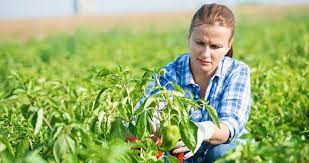The agriculture industry encompasses the cultivation of crops, raising livestock, and the production of various agricultural products. It plays a crucial role in feeding the world’s population, providing raw materials for industries, and contributing to economic development.
In this blog we discuss about few tips for how to be successful in the agriculture industry . The agriculture industry encompasses a wide range of activities, including farming, agribusiness, food processing, and distribution. It is an essential sector that not only fulfills the basic need for food but also supports livelihoods, sustains rural communities, and fosters economic growth in both developed and developing nations.
Different regions specialize in different agricultural products based on their climate, natural resources, and market opportunities. For instance, regions with fertile soils and favorable climates may focus on crop production, while areas with vast grazing lands may excel in livestock rearing. The global agriculture industry is influenced by factors such as climate change, technological advancements, trade policies, and consumer preferences, shaping the production and distribution of agricultural products on a global scale.
Acquiring the Essential Knowledge and Skills

Acquiring the essential knowledge and skills in the agriculture industry is crucial for individuals aspiring to succeed in this field. Understanding the fundamentals of agriculture forms the foundation for effective farming practices. This includes knowledge of different farming methods, such as conventional, organic, or hydroponics, as well as understanding crop selection and rotation, soil management techniques, and pest and disease control measures. By gaining expertise in these areas, farmers can make informed decisions about crop selection, optimize yield, and maintain the health and productivity of their land.
In addition to fundamental knowledge, developing technical skills is essential in modern agriculture. Familiarities with agricultural machinery, such as tractors, harvesters, and irrigation systems, is necessary for efficient operation and maintenance. Proficiency in water management techniques, such as implementing proper irrigation systems and utilizing water resources effectively, is crucial for optimizing crop growth and conserving water. Furthermore, keeping up with advancements in modern farming technologies, such as precision agriculture and drones, enables farmers to enhance productivity, minimize resource wastage, and make data-driven decisions for improved outcomes. Finally, understanding market trends and consumer demands helps farmers identify profitable crops or livestock and explore value-added opportunities, ensuring their products align with market demands and maximize profitability.
Building a Strong Business Foundation
Building a strong business foundation in the agriculture industry involves several key components. Firstly, creating a comprehensive business plan is essential, which includes identifying clear goals and objectives, conducting thorough market research and analysis, implementing effective financial planning and budgeting, and developing robust risk management strategies.
Secondly, establishing strong networks and partnerships plays a vital role, encompassing collaboration with farmers’ associations and agricultural organizations, building relationships with reliable suppliers and buyers, and connecting with researchers, experts, and mentors for valuable guidance and support. Lastly, managing resources efficiently is critical, encompassing activities such as land acquisition and lease agreements, strategic equipment and infrastructure planning, and effective workforce management and training to optimize operational efficiency and maximize productivity.
Embracing Sustainable Practices

Embracing sustainable practices in the agriculture industry is crucial for ensuring long-term environmental and economic viability. Firstly, sustainability holds immense importance in agriculture as it aims to maintain the balance between agricultural production, environmental conservation, and social well-being. By adopting sustainable practices, farmers can mitigate the negative impacts of agriculture on natural resources, reduce carbon emissions, and promote biodiversity.
Conservation of Natural Resources
Conservation of natural resources is a key aspect of sustainable agriculture. Efficient water usage and irrigation practices help minimize water waste and ensure optimal utilization, while Soil Health Preservation and Erosion Control techniques protect the quality of the soil, prevent erosion, and enhance its long-term productivity. Additionally, Biodiversity Conservation and Habitat Protection initiatives safeguard ecosystems, promote beneficial organisms, and maintain the delicate ecological balance in and around agricultural areas.
Adopting Climate-Smart Farming Techniques

Adopting climate-smart farming techniques is another crucial component of sustainability. Crop Diversification and resilient farming methods help farmers adapt to changing climatic conditions, reduce vulnerability to extreme weather events, and ensure a stable food supply. Precision Farming and Data-driven Decision-making enable farmers to optimize resource allocation, minimize input waste, and improve overall efficiency. Moreover, integrating renewable energy sources, such as solar or wind power, in agricultural operations reduces reliance on fossil fuels and decreases greenhouse gas emissions.
Implementing Environmentally friendly Pest and Disease control measures
Implementing environmentally friendly pest and disease control measures is vital for sustainable agriculture. By utilizing integrated pest management (IPM) techniques, farmers can reduce their reliance on chemical pesticides, minimize the impact on non-target organisms, and protect beneficial insects. Implementing biological control methods and promoting natural pest control agents contribute to a healthier ecosystem and a more sustainable farming system overall.
Overcoming Challenges and Ensuring Long-Term Success

Overcoming challenges and ensuring long-term success in the agriculture industry is a dynamic and ongoing endeavor that requires strategic planning, adaptability, and innovation. Farmers face numerous obstacles, including market fluctuations, climate change, evolving consumer preferences, and regulatory constraints. To navigate these challenges and secure long-term success, farmers must implement proactive strategies.
One of the key challenges in agriculture is market fluctuations. Prices of agricultural commodities can be volatile, impacting profitability. To mitigate this risk, farmers need to stay informed about market trends, maintain diverse product offerings, and explore value-added opportunities. By staying ahead of changing consumer preferences and market demands, farmers can position themselves for sustained success.
Climate change poses another significant challenge, impacting agricultural productivity and resilience. Farmers must adapt to changing climatic conditions by embracing climate-smart farming techniques. This includes crop diversification, resilient farming methods, and precision farming practices. By leveraging data analytics and predictive modeling, farmers can make informed decisions regarding planting, irrigation, and pest management, optimizing yields while reducing resource usage.
Climate change has significant implications for agriculture, particularly in terms of increasing temperatures and heat stress on crops and livestock.
Conclusion
In conclusion, achieving success in the agriculture industry requires a combination of knowledge, strategic thinking, and adaptability. By continuously learning and staying updated on agricultural practices, embracing technology, and adopting sustainable practices, you can position yourself for success. Building strong networks, planning strategically, and managing finances effectively are also crucial. However, it is important to remember that success in agriculture takes time and perseverance. By remaining resilient, learning from failures, and staying open to change, you can overcome challenges and thrive in this dynamic industry. Ultimately, the key to success lies in a passion for agriculture, a commitment to excellence, and a willingness to evolve with the ever-changing landscape of the industry.

